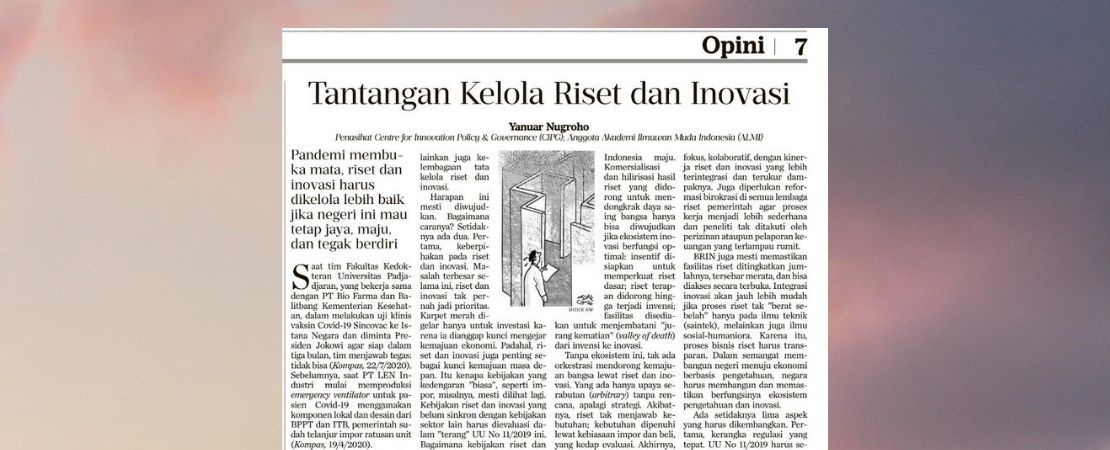This article is originally published in Kompas, 7 August 2020
The pandemic has opened our eyes. Research and innovation must be better managed if this country wants to remain victorious, advanced, and upright.
A team at the Medical Faculty of Padjadjaran University, in collaboration with PT Bio Farma and Ministry of Health Research and Development Agency, is currently conducting clinical trials of the Sinovac Covid-19 vaccine. When they were summoned to the State Palace and told by President Joko Widodo that the vaccine should be ready within three months, the team responded assertively: [we] cannot (Kompas, 22/7/2020).
Before that, when PT LEN Industri started producing emergency ventilators for Covid-19 patients using local components and design from BPPT and ITB, the government had already imported hundreds of units (Kompas, 19/4/2020).
The President’s request, or the policy to import ventilators, is certainly not entirely wrong, especially as it pertains lives and ultimately also our economy.
However, behind all this, the business of research and innovation governance has not seen much improvement. Innovation can be endeavored, but it can never be forced, let alone scheduled.
Innovation can be endeavored, but it can never be forced.
So, if anyone is targeting when innovation must be completed, they definitely do not know what they are talking about, what innovation is, or perhaps are only trying to please their bosses, because managing innovation and creating a conducive environment for innovation to happen is not the same as targeting innovation.
Promoting Innovation
The passage of Law 11/2019 concerning the National System for Science and Technology (Sisnas Iptek Law) and the emergence of the National Research and Innovation Agency (BRIN) that is merged with the Ministry of Research and Technology actually gives a new hope. It provides not only the regulatory basis, but also the institutional structure for research and innovation governance.
This hope must be realized. How? There are at least two ways. First, partiality toward research and innovation. The biggest problem so far: research and innovation has never been a priority.
The red carpet is unfurled only for investment because it is seen as key in the race toward economic prosperoty. Whereas, research and innovation are also important for future progress. That is why policies that seem “regular”, such as imports, need to be reviewed.
Research and Innovation policy that has not been synchronized with the policies of other sectors must be evaluated clearly under Law 11/2019. How should research and innovation policy be developed? How do we improve the career path and ability of researchers? What about research financing? How do we involve the private sector?
Here, the triple helix norm—even n-helix—is useful to ensure synergy between governments, research institutions, businesses, and other stakeholders. This is key, because innovation requires synergy between all sectors, not just the government. Industry, higher education, civil society, as well as communities play a role in the innovation of knowledge, products, as well as services; for the interests of the private sector, government, and the public alike.
Secondly, ensuring the that the knowledge and innovation ecosystem works. Advanced Indonesia 2045 vision is one of knowledge-based economy, not one that relies on selling commodities or relocation of footwear factories any more.
However, it would be impossible to have a knowledge-based economy if our country does not the a working knowledge and innovation ecosystem. It is a prerequisite for Indonesia to progress.
Commercialization or downstreaming of research outputs to jack up the nation’s competitiveness can only be realized if the innovation ecosystem functions optimally: incentives are prepared to strengthen basic research; applied research is supported to produce inventions; facilities are provided to bridge the valley of death between invention and innovation.
Advanced Indonesia 2045 vision is one of knowledge-based economy.
Without this ecosystem, there is no orchestration to advance the nation through research and innovation. Instead, there is only arbitrary efforts, without a plan, let alone a strategy. As a result, research fails to address needs; the needs are met through the habit of importing and buying that is not subject to evaluation. Ultimately, innovation ebbs, then dies.
Meanwhile, knowledge ecosystem shall be built so that the knowledge is integrated deliberately, in a planned and intentional manner into our lives through public policy. It is not just about the use of evidence in policymaking, but also about taking into account the unintended consequences in every development policy.
The impact on local communities, environmental damage, erosion of tradition and culture due to development policies, for example, not only must be considered, but must be anticipated and mitigated in the planning.
State presence
The two keys, partiality for and preparation of the ecosystem, shall be the focus for the presence of the state in research and innovation sector through the Ministry of Research and Technology/BRIN in President’s Joko Widodo’s second period.
Minister of Research and Technology/Head of National Research and Innovation Agency Bambang PS Brodjonegoro (left) speaking with the Chief Executive of PT Bio Farma Honesti Basyir in Bandung, West Java, Wednesday (29/7/2020). Besides conducting clinical trials for the Covid-19 vaccine candidate produced by Sinovac, China, Bio Farma is also being prepared to produce the nation’s own Red and White vaccine.
The role of the state through BRIN is to ensure reform in the state governance of research to be self-sufficient, focused, collaborative, with a more integrated research and innovation performance and measurable impact. It is also necessary to ensure bureaucratic reform in all government research institutions to simplify the working process and ensure that researchers are not inhibited by complicated permit or financial reporting requirements.
BRIN must also ensure that the number of research facilities are increased, better distributed, and more accessible. Integration of innovation will be far easier if the research process is not slanted only toward STEM, but also includes social sciences and humanities.
Therefore, the research business process must be transparent. In the spirit of developing the nation toward knowledge-based economy, the state must develop and ensure a working knowledge and innovation ecosystem.
There are at least five aspects to be developed. First, the right regulatory framework. Derivative regulations for Law 11/2019 must be prepared urgently to ensure the integration of research and innovation ecosystem. Secondly, there needs to be incentive and funding schemes to support knowledge integration.
Integration of innovation will be far easier if the research process is not slanted only toward STEM, but also includes social sciences and humanities.
Besides the existing LPDP and DIPI schemes, other incentive schemes must be devised so that all actors can move independently and continuously. Third, the supporting institutional setting for research and technology shall be designed carefully to avoid overlaps in the roles between actors. Fourth, governance and accountability mechanism to ensure that research and innovation is not constrained by regulations that hinders research. Lastly, the development of human resource that is not discipline-biased to build an inclusive innovation that does not rely on just a handful of knowledge disciplines.
Innovation is never linear. It is always multiparty and has many stages. It can never be forced, but the process can be organized. The task of the state is to harmonize research and innovation with the goals of national development.




